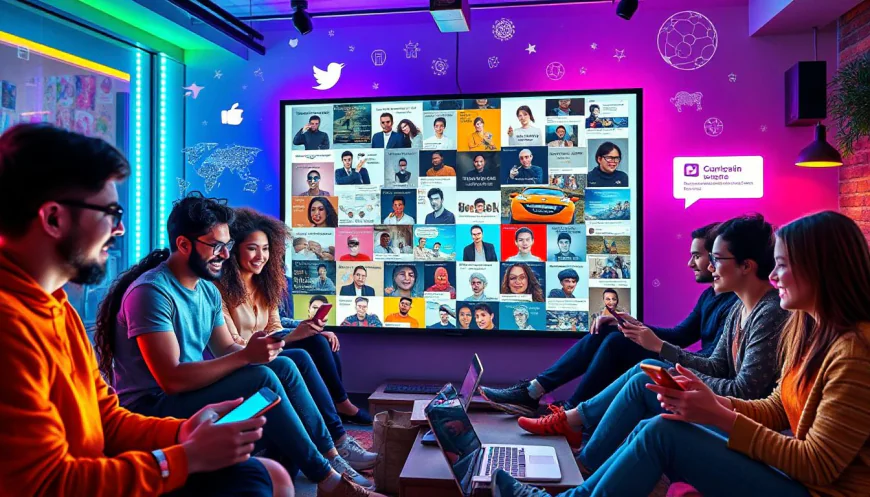The Language of Memes: How Internet Humor Shapes Global Discourse
Memes are everywhere—on social media, in texts, even in conversations. They’re more than just funny pictures; they’re a new way we talk and share ideas. Platforms like TikTok, Reddit, and Instagram make it easy to spread memes fast, turning quick laughs into powerful tools. Memes can influence opinions, spark movements, and shape cultures around the world. They’re a universal language, breaking down walls of different languages and backgrounds. In this article, you’ll see how memes don’t just entertain us—they change how we see the world.

The Evolution of Meme Culture and Digital Communication
The Origins and Rise of Memes
Memes started as simple jokes on early internet forums like 4chan and Reddit. Back then, people would share funny images or phrases to connect. Over time, those jokes grew into complex memes with shared meanings. Today, memes are everywhere—on Instagram, TikTok, and Twitter. They’ve become a main way we communicate online, blending humor, culture, and even politics.
Memes as a New Language
Memes are like shorthand—quick, visual ways to share ideas. Instead of long explanations, a meme can tell a story or make a point with just an image and a few words. They create shared references, so when someone sees a meme, they get the message instantly. Think of memes as a digital slang, a secret code that only internet users understand.
The Spread of Memes Across Borders
Some memes go viral worldwide, crossing language barriers easily. Take “Distracted Boyfriend,” for example. It’s a simple picture but has been used to comment on everything from politics to relationships. Visual humor helps memes spread because anyone can understand them, no matter where they’re from. They make conversations across cultures more fun and inclusive.
How Memes Shape and Reflect Global Discourse
Memes as Tools for Social and Political Commentary
Memes are now part of protests and political debates. During the Hong Kong protests, memes helped spread messages of resistance. Black Lives Matter activists used memes to share calls for justice. Even during the COVID-19 pandemic, humor helped people cope with tough times. Memes turn complex issues into shareable messages that reach millions quickly.
The Power of Memes in Influencing Public Opinion
Some memes have huge power—shaping attitudes and beliefs. A viral meme can change what people think about a candidate, a policy, or an event. Experts say memes influence how we perceive issues, because they stick in our minds. For example, the “OK Boomer” meme became a way younger generations expressed frustration or disagreement with older ones—impacting conversations on age and politics.
Memes and Cultural Identity
Memes can boost pride or cause controversy about a country’s identity. Brexit memes, for example, often showed humor and criticism about the UK leaving the EU. In the US, political memes reflect different viewpoints and stereotypes. Ultimately, memes can reinforce or challenge what it means to be part of a community.
The Mechanics of Meme Communication
Visual Language and Meme Syntax
Memes often follow common formats—templates that people recognize. Some are simple images with funny captions, others are complex jokes or inside references. The way captions are written, the punchline, or the meme’s layout helps communicate humor or message quickly. Meme syntax is like a code—understood by those in the know.
Language, Humor, and Cultural Context
Humor varies around the world, which can make some memes lose their meaning across cultures. An inside joke in one country might be confusing in another. That’s why understanding cultural context is important when creating or sharing memes. Sometimes, memes unintentionally offend or cause misunderstandings, so sensitivity is key.
The Role of Internet Slang and Text
Many memes include abbreviations and slang—“LOL,” “Among Us,” or emojis—to add flavor and emotion. These words help express feelings quickly and fit into the fast pace of online life. They also help memes feel more relatable and fun, making the message stick.
Challenges and Controversies Surrounding Memes
Memes and Misinformation
Not all memes spread truth. Some show false information, stereotype groups, or sway opinions unfairly. During elections or health crises, memes have helped spread rumors and fake news. That’s why being critical of the memes we share is more important than ever.
Ethical Concerns and Cultural Appropriation
Some memes offend or hurt people, especially when they amplify stereotypes or cultural sensitivities. Sharing memes without thinking can cause real harm. Platforms need responsibilities like moderating offensive content, but creators also must be mindful of the impact their humor has.
The Fragility of Meme Virality
Memes can explode in popularity but also die out quickly. What’s hilarious today might be irrelevant tomorrow. Sometimes, memes cause harm or become problematic after a closer look. Creators should aim for respectful, inclusive humor that lasts longer and spreads positivity.
The Future of Meme Language and Global Discourse
Emerging Trends in Meme Culture
AI is now helping create memes, and virtual reality may soon host immersive meme experiences. Expect memes to become even more personalized and innovative, blending tech with humor. Memes could also help in education—making learning more engaging.
The Role of Memes in Future Communication
Memes will likely continue influencing activism, education, and even diplomacy. They can be tools for spreading messages, rallying support, or educating people about important issues. The challenge is to keep memes meaningful and respectful while staying creative.
Actionable Tips for Engaging with Meme Culture Responsibly
- Always check if a meme might offend or mislead.
- Create humor that’s inclusive and thoughtful.
- Use memes to spread positive messages or educate others.
- Remember, comedy can be powerful—use it wisely.
Conclusion
Memes are more than just funny content—they’re a universal language shaping global conversations. They connect cultures, influence opinions, and reflect society’s values. As memes grow and change, so does how we share ideas in this digital world. Engaging with meme culture thoughtfully can help bridge gaps or, sometimes, deepen divides. The key? Respect the power of memes—they’re shaping our world, one laugh at a time.



 VARSHITHA
VARSHITHA